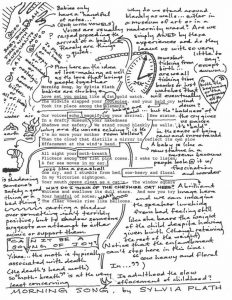
A Visual Annotation of Sylvia Plath’s “Morning Song” – Credit: Glen Downey, www.comicsineducation.com
July 28 – August 1, 2019
Eberhard Karls University Tübingen (Germany)
Download the CfP as PDF here.
Explanatory annotations have always had a somewhat precarious and even paradoxical status: with a few exceptions, they have been considered “below” the concern of the theorist and literary critic, while in some sense they have also been considered “above” the sphere of the textual editor, who has eyed their flights of interpretive fancy with distrust. They have been suspected of manipulating the reader in a clandestine fashion while at the same time they have been regarded as a necessity, for they are an essential means of keeping alive many texts of world literature, from Homer to the Modernists, by making them comprehensible and meaningful to readers.
In the digital age, annotations have overcome some of their traditional limitations and perhaps been subjected to new ones. Their precarious status has assumed a new form, as they are now located somewhere between being an explanatory and tool and just serving as the markup of texts. In the latter role, however, they may become a key device for making large corpora answer questions that go beyond the scope of individual texts. All this makes it even more urgent than ever to link theoretical reflexion on annotations with specific analyses and models of best practice.
The subject of “Understanding (through) Annotations” is well suited to the programme of Connotations, as it combines the detailed study of individual texts written in
English with wider theoretical perspectives. (For previous examples, see our special issues). In our 2019 symposium, this means considering concepts of understanding literary texts through annotations, and getting a better idea of what is involved in explaining texts locally. In this way, the Connotations Symposium also contributes to current research on explanatory annotation (see http://www.annotation.es.uni-tuebingen.de/)
We invite papers that are concerned with annotations to specific literary texts written in English and address their functions. Papers may also reflect on the speakers’ own annotation projects, analyse existing annotations, offer suggestions as to a more systematic approach to the practise of annotating texts, and/or discuss historical and theoretical dimensions involved, such as the relation of lemma and context, part and whole, the envisaged reader of annotations, etc.
Please send an abstract (300 words max.) to the editors of Connotations by October 15, 2018: symposium2019@connotations.de.